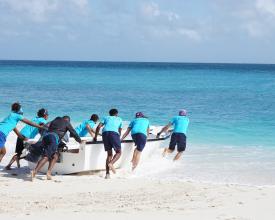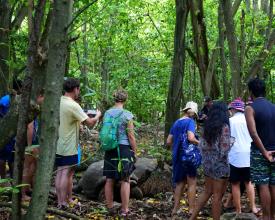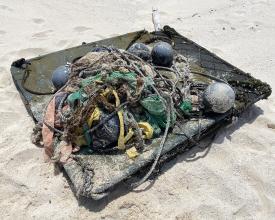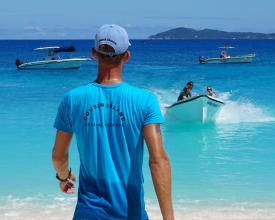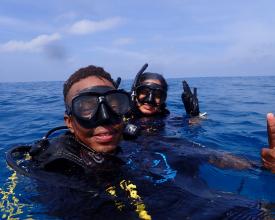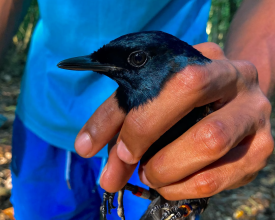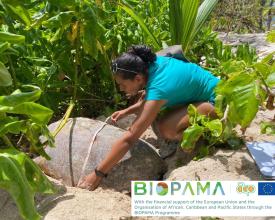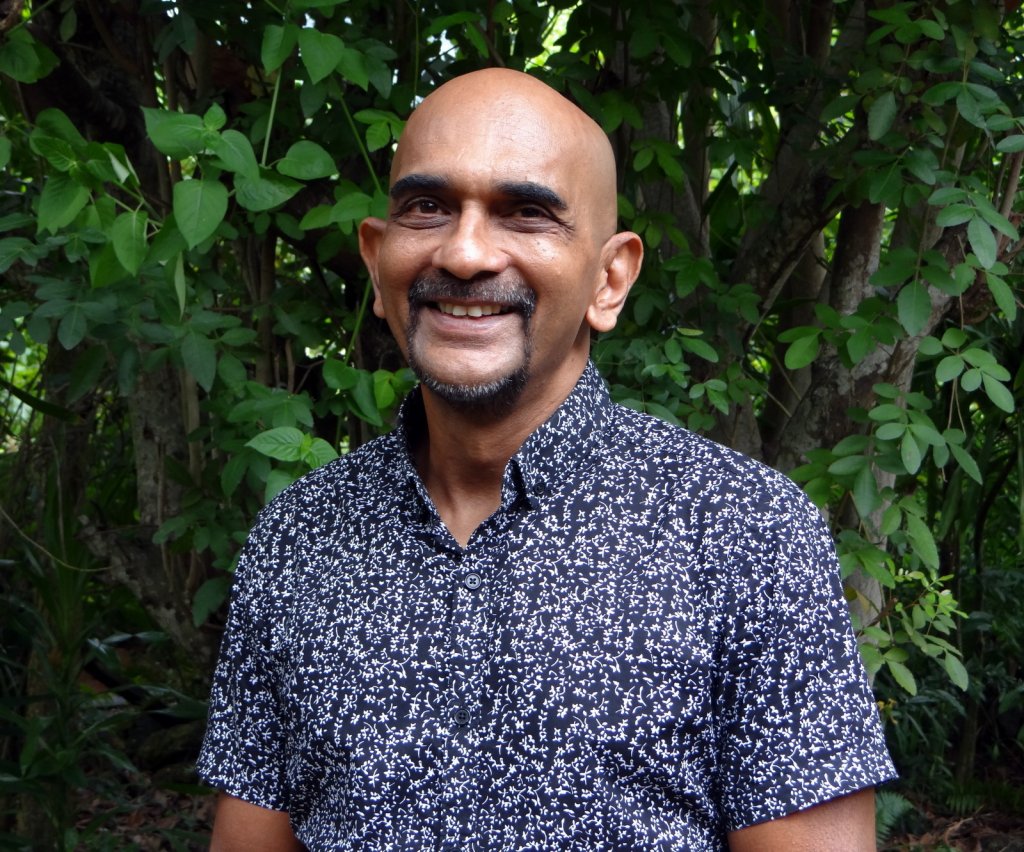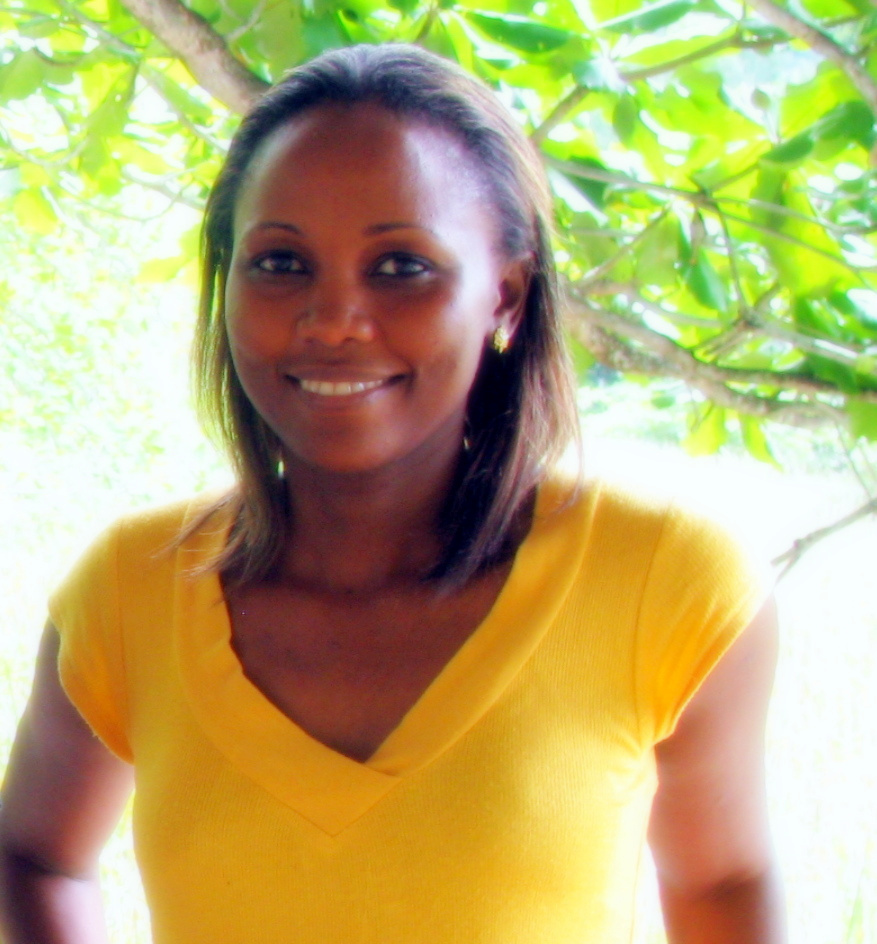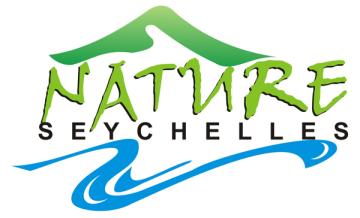
Une bouée de sauvetage pour l'AMP de la réserve spéciale de l'île Cousin
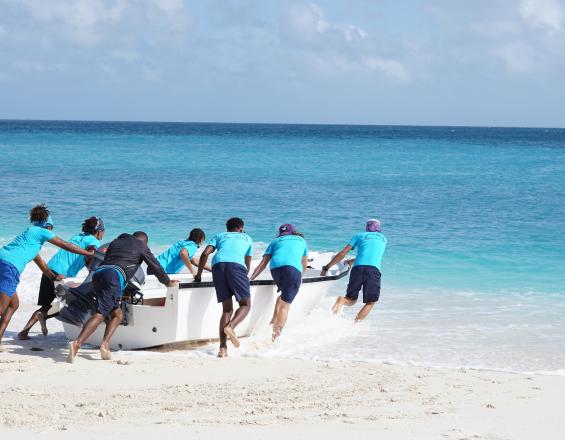
La réserve spéciale de l'île Cousin, aux Seychelles, est financée de manière durable par l'écotourisme depuis plus de 50 ans. Une taxe d'utilisation touristique (TUF) finance les activités de conservation d'une série d'espèces, notamment les oiseaux terrestres, les oiseaux marins et les tortues imbriquées en voie de disparition, ainsi que la surveillance et l'entretien des infrastructures. La pandémie de Covid-19 a réduit à néant les recettes de l'écotourisme, ce qui a entraîné des pénuries de financement. Une subvention de réponse rapide du BIOPAMA a permis de combler cette lacune, en finançant principalement les salaires de 8 gardiens et d'un responsable scientifique qui travaillent sur l'île et assurent la conservation, la recherche, la surveillance et l'entretien. La réserve spéciale de l'île Cousin a été en mesure de conserver son personnel et de mener efficacement des activités de conservation et d'entretien.
Contexte
Défis à relever
La solution visait à surmonter le problème de financement des opérations de la réserve spéciale de l'île Cousin pendant la pandémie de Covid-19. Le manque de moyens financiers a mis la réserve et l'AMP en danger. Dans un scénario alternatif, sans personnel sur place 24 heures sur 24 et 7 jours sur 7, les espèces menacées telles que le merle des Seychelles et la tortue imbriquée, toutes deux fortement gérées, ne seraient pas surveillées ; d'autres activités de conservation essentielles telles que la surveillance et le recensement des oiseaux de mer, des tortues et des lézards, la surveillance et le nettoyage des profils de plage et l'élimination des espèces envahissantes auraient cessé ; il n'y aurait pas de surveillance pour gérer le braconnage (des oiseaux de mer et des tortues) et la pêche illégale dans l'AMP ; et l'infrastructure ne serait pas entretenue. La recherche à long terme sur la fauvette des Seychelles nécessite la présence d'un noyau de personnel sur place pour accueillir les chercheurs, ainsi que la formation d'étudiants d'établissements d'enseignement supérieur dans le cadre d'un stage en entreprise.
Emplacement
Traiter
Résumé du processus
La gestion d'une AMP nécessite des ressources humaines et financières considérables. Pour maintenir l'AMP à flot, il était essentiel de disposer d'un noyau de personnel prêt à continuer à travailler à distance malgré les défis posés par la pandémie de Covid-19. Cela a été possible grâce au financement des donateurs qui ont pu prendre en charge les salaires. La main-d'œuvre supplémentaire fournie par les étudiants en stage a permis de mener à bien les vastes travaux de conservation, de surveillance et d'entretien et de combler le vide laissé par le défunt programme de bénévolat. L'île Cousin n'a pu être ouverte à l'écotourisme pendant la période Covid-19 qu'une fois certifiée "sûre" pour les voyages, et il était donc primordial de répondre à toutes les exigences gouvernementales.
Blocs de construction
PA Effectivement habité - "Le dernier groupe sur le Titanic".
L'efficacité de la gestion de la réserve dépendait de la volonté du personnel de base - 8 gardiens et 1 responsable scientifique - de rester dans la réserve naturelle malgré le confinement et les restrictions imposés dans tout le pays. Ce personnel a choisi de rester sur l'île pour mener à bien les activités de l'AMP au lieu de rester chez lui avec sa famille. Pour situer le contexte, l'île Cousin est relativement isolée. Le personnel vit sur l'île sans partenaire ni famille et a la possibilité de quitter l'île le week-end. Cependant, pendant les fermetures de Covid-19, leurs déplacements limités ont été encore plus restreints par des restrictions.
Facteurs favorables
- Financement disponible auprès des donateurs pour conserver le personnel de base
- Personnel engagé
Leçon apprise
- Pour gérer une AMP, il faut une équipe engagée qui va au-delà de l'appel du devoir. Cependant, elle doit également être rémunérée pour son travail
- L'efficacité de la gestion peut s'effondrer en fonction de la capacité à faire face à des périodes prolongées de difficultés financières.
- Nous devons continuer à sauvegarder les actifs naturels stratégiques et les services essentiels qu'ils fournissent afin de maintenir la résilience nécessaire pour nous aider à rebondir après une crise.
Ressources
Disponibilité de fonds de donateurs pour les salaires
Le maintien du personnel a été rendu possible grâce à la disponibilité de la subvention de réponse rapide pour financer les salaires. L'île Cousin était autonome depuis de nombreuses années avant la pandémie. Le financement du donateur a permis de remédier au manque de financement de la réserve dû à l'effondrement de l'industrie du tourisme aux Seychelles.
Facteurs favorables
- Un donateur prêt à financer les salaires
- Un personnel dévoué
Leçon apprise
- Les sources traditionnelles de financement et d'autres types de soutien se sont taries au cours de la période Covid-19. Cette crise a été une alerte rouge pour la conservation de la biodiversité. Les défenseurs de la nature doivent rechercher des formes de soutien novatrices, apprendre beaucoup de choses nouvelles et faire plus avec moins, notamment en utilisant des technologies de rupture telles que l'IA et les drones ou en monétisant les expériences de tourisme virtuel
- Nous devons chercher des moyens d'obtenir des revenus non affectés pour les budgets de conservation récurrents en dehors du tourisme. Notamment en 2021, nous avons travaillé avec l'UICN et la Fondation Porini pour lancer le Robin pie des Seychelles en tant que premier objet de collection de la nature, un NFT pour la conservation afin de collecter des fonds pour la conservation de l'espèce.
Ressources
Partenariats pour la conservation
Une main-d'œuvre supplémentaire a été fournie par des étudiants de deux institutions - l'Académie maritime des Seychelles et l'Académie du tourisme des Seychelles - dans le cadre de stages en entreprise. Au total, 10 étudiants sont venus sur l'île. Ils se sont révélés extrêmement utiles, remplaçant les volontaires rémunérés du Conservation Boot Camp, qui s'est également effondré à la suite des restrictions de voyage imposées par le Covid-19. L'un des étudiants a finalement été embauché. Un autre partenariat naissant a été formé avec les garde-côtes des Seychelles, auxquels le personnel a signalé les bateaux de pêche illégaux. Enfin, une fois que le gouvernement a autorisé la reprise de l'écotourisme, les voyagistes partenaires ont commencé à ramener des visiteurs sur l'île Cousin.
Facteurs favorables
- Le programme de formation de Nature Seychelles déjà en place, connu sous le nom d'"EnvironMentor", et une relation à long terme avec les écoles d'accueil. La plupart des employés de l'île sont issus de ces établissements.
- Une relation à long terme avec les voyagistes qui amènent des visiteurs sur l'île depuis des décennies.
Leçon apprise
La confiance établie avec les voyagistes au fil des ans a joué un rôle important dans la reprise de l'écotourisme, mais de nouveaux voyagistes (à petite échelle) ont commencé à venir sur l'île, probablement en raison de la diversification des revenus pendant et après la pandémie.
Respect des exigences en matière de santé et de sécurité du tourisme pour la réouverture
Après s'être maintenue à flot et avoir satisfait aux exigences sanitaires du gouvernement, l'île a été rouverte plus tôt que prévu à l'écotourisme. Le personnel a été formé par les autorités sanitaires au maintien de la sécurité pendant les visites, et des panneaux ont été installés pour inciter les visiteurs à respecter les règles d'hygiène et d'autres protocoles. Toute l'équipe de l'île a été vaccinée. Dans le cadre d'un processus de numérisation, Nature Seychelles a mis en place une option de paiement en ligne pour faciliter l'achat des billets. Les tour-opérateurs ont été contactés et informés des exigences des autorités sanitaires avant la réouverture.
Facteurs favorables
- Le personnel a été vacciné et a suivi les nouveaux protocoles sanitaires pour les visiteurs.
- La direction de Nature Seychelles/Cousin Island a travaillé d'arrache-pied pour satisfaire à toutes les exigences et obtenir la certification de sécurité.
- Un système de paiement en ligne a été mis en place pour compléter les transactions physiques.
Leçon apprise
- Une gestion adaptative permettant de trouver rapidement des moyens de fonctionner en temps de crise a été nécessaire.
- Une gestion proactive qui sort des sentiers battus de la conservation et collabore avec toutes les autorités pour garantir la priorité à la conservation des espèces.
Impacts
En conséquence, le personnel de base de l'île a été conservé,
- Le personnel de base de l'île a été conservé ;
- Les activités de conservation essentielles se sont poursuivies, en particulier la surveillance des oiseaux terrestres en danger, des tortues imbriquées en danger critique d'extinction, des oiseaux marins nicheurs, l'élimination des espèces envahissantes, le recensement des tortues et des lézards, le nettoyage des plages et l'établissement de profils ; deux rapports ont été produits et les données collectées ont été regroupées pour d'autres rapports.
- Patrouilles quotidiennes à terre et en mer, retrait d'un piège de pêche illégale et d'un dispositif de concentration de poissons dans la ZMP ; relation naissante avec les garde-côtes des Seychelles et mise en place d'une procédure officielle de signalement des bateaux de pêche illégaux ;
- 10 étudiants des académies maritimes et touristiques des Seychelles ont suivi une formation en alternance et ont apporté une aide supplémentaire ; l'un d'entre eux a été embauché comme gardien.
- La recherche à long terme et d'importance mondiale sur la fauvette des Seychelles s'est poursuivie en collaboration avec des universités étrangères.
- L'île Cousin a rouvert ses portes aux touristes plus tôt que prévu, car le personnel était sur place pour proposer des visites guidées de l'île axées sur l'écotourisme, et les recettes ont commencé à affluer.
- Entretien des sentiers, des réservoirs d'eau, du système d'énergie solaire, des bateaux et des moteurs, ainsi que des bâtiments (logements du personnel et des chercheurs, ainsi qu'un petit laboratoire).
Bénéficiaires
- Le personnel qui a conservé son salaire et l'ONG qui a gardé son personnel de base
- Les étudiants en stage et les chercheurs
- Nature Seychelles ne recevant pas de revenus
- Les tour-opérateurs bénéficiant de l'écotourisme.
- Conservation et tourisme aux Seychelles
Objectifs de développement durable
Histoire
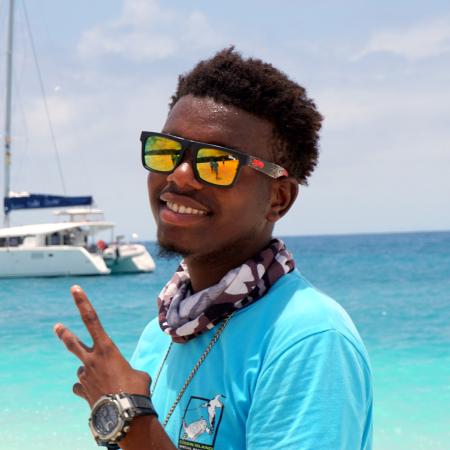
Vous rencontrerez très probablement Christopher Rose lors de votre visite sur l'île Cousin. Christopher, surnommé "Carrot" par ses collègues gardiens, organise des visites guidées de l'île, présentant à ses visiteurs la biodiversité unique des Seychelles. Avec son accent typique de l'île, il régale les visiteurs d'histoires : comment les puffins ressemblent à des fantômes au crépuscule, comment les merles des Seychelles vous suivent lorsque vous sifflez, et comment George, la plus ancienne tortue géante d'Aldabra de l'île, est un homme à femmes.
La confiance de Christopher est immédiatement apparente.
"Comme tous nos gardiens, il maîtrise le maniement des petits bateaux, les pratiques de conservation, notamment le suivi des espèces et la lutte contre les espèces envahissantes, la surveillance, la gestion des visiteurs et le guidage, les petites réparations et l'entretien, ainsi que les compétences non techniques, comme les relations avec les parties prenantes. Les gardes de l'île Cousin font probablement partie du personnel le plus multidisciplinaire des zones protégées dans le monde", déclare le Dr Nirmal Shah, directeur général de Nature Seychelles.
Vous serez peut-être surpris d'apprendre que Carrot est un nouveau venu sur l'île Cousin. Il y a à peine deux ans, il était un étudiant fraîchement diplômé de l'Académie du tourisme des Seychelles et faisait ses premiers pas vers une carrière de gardien de la nature. Il fait partie des dix étudiants qui ont effectué leur stage sur l'île en 2021. Leur formation a été rendue possible grâce à la bourse du BIOPAMA.
Il a été recruté à l'issue de son stage sur Cousin après avoir fait preuve d'un comportement et de capacités exemplaires.
Au moment de son affectation, l'activité préférée de Christopher était les patrouilles de tortues. Il aimait voir les tortues venir pondre leurs œufs et les nouveaux-nés se diriger vers l'océan.
Aujourd'hui, il est compétent en matière de surveillance des tortues et est souvent chargé d'être le chef d'équipe des tortues, aidant les bénévoles à apprendre les ficelles de la surveillance.
Mais ce qu'il aime le plus, c'est parler aux visiteurs.
L'écotourisme est le principal mécanisme de financement de la conservation du Cousin. Son succès est le fruit d'efforts délibérés pour fournir un excellent produit et ses opérations sont alignées sur les normes internationales.
"Notre défi est de maintenir l'intégrité de l'île en tant que berceau de la biodiversité et site écotouristique populaire", conclut le Dr Nirmal Shah. "Ce soutien financier pendant la crise du Covid-19 nous a aidés à y parvenir.

